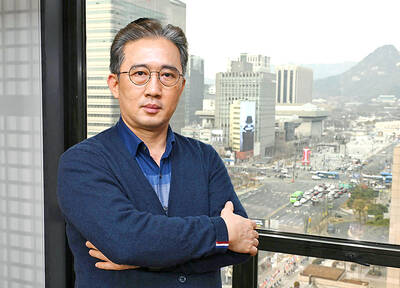France and Britain failed to persuade the EU to back their call to lift an arms embargo on Syrian rebels on Friday, despite warning that Syrian President Bashar al-Assad could resort to using chemical weapons.
Paris and London want to exempt al-Assad’s opponents from an EU arms embargo, a step they believe would raise pressure on al-Assad to negotiate after two years of a civil war that has claimed at least 70,000 lives.
However, they won little support from other EU member states at a foreign ministers’ meeting in Dublin, diplomats said, despite raising concerns about chemical weapons to bolster their case.
“I insisted that very close attention must be paid to the possible use by al-Assad of chemical weapons ... There are indications that he might have used them or that he might use them,” French Foreign Minister Laurent Fabius told reporters at the close of Friday’s talks.
Al-Assad’s supporters and opponents accused each other of using chemical weapons after 26 people were killed in a rocket attack near the northern city of Aleppo this week.
In a letter to EU High Representative for Foreign Affairs and Security Policy Catherine Ashton setting out their case, Fabius and British Foreign Secretary William Hague said they were “increasingly concerned about the regime’s willingness to use chemical weapons.”
Countries such as Germany and Austria remain opposed to lifting the arms embargo for the rebels.
They fear it could lead to weapons falling into the hands of Islamist militants, fuel regional conflict and encourage al-Assad’s backers, Iran and Russia, to step up arms supplies to him.
“We are reluctant about lifting the embargo ... We have to avoid that weapons could come into the wrong hands and that terrorists, jihadists, extremists would misuse these weapons,” Germany’s Foreign Minister Guido Westerwelle told reporters.
The EU has until June 1 to decide whether to renew or amend its sanctions on Syria and discussions on what to do about the arms embargo will continue in EU working groups.
Meanwhile, the US’ CIA has been feeding information to select rebel fighters in Syria to try to make them more effective against government troops, the Wall Street Journal reported yesterday.
Citing unnamed current and former US officials, the newspaper said the new CIA effort reflected a change in the administration’s approach that aims to strengthen secular rebel fighters.
The CIA has sent officers to Turkey to help vet rebels who receive arms shipments from Gulf allies, the report said.
However, administration officials cited concerns about some weapons going to Islamists, the newspaper added.
In Iraq, the CIA has been directed by the White House to work with elite counterterrorism units to help the Iraqis counter the flow of al-Qaeda-linked fighters across the border with Syria, the Journal said.
According to the report, the West favors fighters aligned with the Free Syrian Army, which supports the Syrian Opposition Coalition political group.
Syrian opposition commanders said the CIA had been working with British, French and Jordanian intelligence services to train rebels in the use of various kinds of weapons, the paper said.
The move comes as the al-Nusra Front, the main al-Qaeda-linked group operating in Syria, is deepening its ties to the terrorist organization’s central leadership in Pakistan, the Journal said.

VAGUE: The criteria of the amnesty remain unclear, but it would cover political violence from 1999 to today, and those convicted of murder or drug trafficking would not qualify Venezuelan Acting President Delcy Rodriguez on Friday announced an amnesty bill that could lead to the release of hundreds of prisoners, including opposition leaders, journalists and human rights activists detained for political reasons. The measure had long been sought by the US-backed opposition. It is the latest concession Rodriguez has made since taking the reins of the country on Jan. 3 after the brazen seizure of then-Venezuelan president Nicolas Maduro. Rodriguez told a gathering of justices, magistrates, ministers, military brass and other government leaders that the ruling party-controlled Venezuelan National Assembly would take up the bill with urgency. Rodriguez also announced the shutdown

Chinese President Xi Jinping’s (習近平) purge of his most senior general is driven by his effort to both secure “total control” of his military and root out corruption, US Ambassador to China David Perdue said told Bloomberg Television yesterday. The probe into Zhang Youxia (張又俠), Xi’s second-in-command, announced over the weekend, is a “major development,” Perdue said, citing the family connections the vice chair of China’s apex military commission has with Xi. Chinese authorities said Zhang was being investigated for suspected serious discipline and law violations, without disclosing further details. “I take him at his word that there’s a corruption effort under

China executed 11 people linked to Myanmar criminal gangs, including “key members” of telecom scam operations, state media reported yesterday, as Beijing toughens its response to the sprawling, transnational industry. Fraud compounds where scammers lure Internet users into fake romantic relationships and cryptocurrency investments have flourished across Southeast Asia, including in Myanmar. Initially largely targeting Chinese speakers, the criminal groups behind the compounds have expanded operations into multiple languages to steal from victims around the world. Those conducting the scams are sometimes willing con artists, and other times trafficked foreign nationals forced to work. In the past few years, Beijing has stepped up cooperation

The dramatic US operation that deposed Venezuelan president Nicolas Maduro this month might have left North Korean leader Kim Jong-un feeling he was also vulnerable to “decapitation,” a former Pyongyang envoy to Havana said. Lee Il-kyu — who served as Pyongyang’s political counselor in Cuba from 2019 until 2023 — said that Washington’s lightning extraction in Caracas was a worst-case scenario for his former boss. “Kim must have felt that a so-called decapitation operation is actually possible,” said Lee, who now works for a state-backed think tank in Seoul. North Korea’s leadership has long accused Washington of seeking to remove it from power